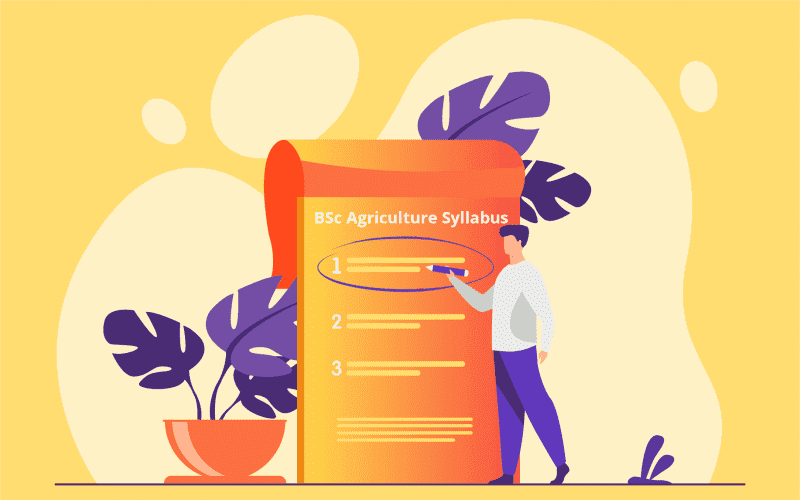The Agricultural sector is an essential part of our Economy and existence. It not only provides food to us but also supplies raw materials to numerous industries. A career in Agriculture is full of opportunities due to the huge role it plays in our lives. The importance of studying Agriculture includes the need for brainpower and innovations that can help produce healthy and surplus food. BSc Agriculture is a common UG course offered by all the universities in India and abroad to eradicate existing food challenges in the world. Read this blog to get a detailed report on the BSc Agriculture syllabus for 2023.

Course Highlights
| Degree | Bachelors |
| Full Form | Bachelor of Science in Agriculture |
| Duration | 4 Years |
| Minimum Percentage | 50% in 10+2 from a recognized board like CBSE or ICSE |
| Average Fees | INR 2 – 2.5 LPA |
| Average Salary | INR 6 LPA [Source: Payscale] |
| Employment Roles | Agriculturalist, Agricultural Research Scientist, Agriculture Development Officer, Assistant Plantation Manager, Agriculture Technician, etc |
This Blog Includes:
What is BSc Agriculture?
BSc Agriculture is primarily focused on the study of Agricultural Sciences. It is 4 years long in duration. It covers topics like Soil Science, Plant Breeding, Genetics, Agricultural Microbiology, Plant Pathology, and Food Microbiology. The course promotes modern techniques to improve water resource management, soil texture, poultry management, land surveying, and various other challenges. The main objective of this course is to assist the future generation with ways to improve agricultural productivity and yield along with minimizing the loss of crops.
BSc Agriculture Syllabus – Semester Wise
Checkout the semester-wise syllabus for BSc Agriculture:
First Year
| Semester I | Semester II |
| Fundamentals Of Horticulture | Fundamentals Of Genetics |
| Fundamentals Of Plant Biochemistry and Biotechnology | Agricultural Microbiology |
| Fundamentals Of Soil Science | Soil And Water Conservation Engineering |
| Introduction To Forestry | Fundamentals Of Crop Physiology |
| Comprehensive & Communication Skills In English | Fundamentals Of Agricultural Economics |
| Fundamentals Of Agronomy | Fundamentals Of Plant Pathology |
| Introductory Biology | Fundamentals Of Entomology |
| Basic Mathematics | Fundamentals of Agricultural Extension Education |
| Agriculture Heritage | Communication Skills |
| Rural Sociology and Educational Psychology | – |
| Environment and Waste Management | – |
Second Year
| Semester III | Semester IV |
| Crop Production Technology (Kharif Crops) | Crop Production Technology –II (Rabi Crops) |
| Fundamentals of Plant Breeding | Ornamental Crop Production, MAP and Landscaping |
| Agricultural Finance and Cooperation | Renewable Energy and Green Technology |
| Agri-Informatics | Problematic Soils and their Management |
| Farm Machinery and Power | Production Technology of Plantation Crops |
| Production Technology for Vegetables and Spices | Principles of Seed Technology |
| Statistical Methods | Farming Systems and Sustainable Agriculture |
| Livestock and Poultry Management | Agricultural Marketing, Trade and Prices |
| Social and Professional Ethics | Introductory Agro-meteorology & Climate Change |
| Gender Equality and Women Empowerment | Introduction to Management & Leadership |
| Introduction to Artificial Intelligence | Entrepreneurship |
Third Year
| Semester V | Semester VI |
| Geoinformatics And Nano-technology For Precision Farming | Principles Of Food Science And Nutrition |
| Intellectual Property Rights | Concepts Of Organic Farming |
| Principles of Integrated Pest and Disease Management | Rainfed Agriculture And Watershed Management |
| Management of Manure Fertilizers and Soil Fertility | Protected Cultivation and Secondary Agriculture |
| Crop Improvement-1 (Kharif Crops) | Crop Improvement -II (Rabi crops) |
| Management of Crops Pests and Stored Grains | Management Of Beneficial Insects |
| Entrepreneurship Development And Business Communication | Management of Crops and Pests |
| Management of Field and Horticultural Crops and Diseases- 1 | Management of Postharvest and Fruits and Vegetables Value Addition |
| Crop Production Technology –I (Kharif Crops) | Farm Management, Production & Resource Economics |
| Practical Crop Production –II (Rabi crops) |
Fourth Year
| Semester VII | Semester VIII |
| Orientation & On-campus training conducted by various faculties | Production Technology for Bioagents and Biofertilizer |
| Preparing, Presenting, and Evaluating Project Report | Seed Production and Technology |
| – | Mushroom Cultivation Technology |
| – | Soil, Plant, Water, and Seed Testing |
| – | Commercial Beekeeping |
BSc Agriculture Electives
Students in the fifth and sixth semesters must select two elective subjects for each semester, which are:
- Agribusiness Management
- Food Safety and Standards
- Protected Cultivation
- Commercial Plant Breeding
- Weed Management
- Hi-tech Horticulture
- Landscaping
- Agrochemicals
- Agricultural Journalism
Note: The syllabus mentioned above may vary from university to university according to their curriculum and faculty.
Get in-depth knowledge of BSc Agriculture subjects!
Also Read: Jobs After BSc Agriculture
BSc Agriculture – Evaluation Process
The evaluation of BSc Agriculture subjects is based on a wide range of criteria, including presentation, project work, report writing skills, and so on.
Look at the table below to learn about the parameters that are involved in the course assessment scheme that is used by almost all colleges:
| Project Planning and Writing | Presentation |
| Monthly Assessment | Output delivery |
| Business networking skills | Report Writing Skills |
| Technical Skill Development | Final Presentation |
BSc Agriculture Eligibility
The following are the eligibility requirements for applying to B.Sc. Agriculture programmes:
- Candidates who wish to apply for B.Sc. Agriculture must have passed a 10+2 or equivalent exam from a recognised Board.
- They must obtain a minimum of 50% on the 10+2 level exam.
- Candidates must have completed the 10+2 level exam in Science with Physics, Chemistry, Biology, and/or Mathematics as the main subjects.
- Students who have completed intermediate in the Agriculture stream are also eligible to apply for the B.Sc. Agriculture course.
Popular Universities
[optin-monster-shortcode id=”xf2mlnjiouddzrshykdb”]A good university can make a great difference in your future and career. Here is the list of popular universities abroad that are well-known for Bsc Agriculture:
- University of Reading
- Murdoch University
- Massey University
- Curtin University
- Lincoln University
- The University of Auckland
- The University of Newcastle
- University of Florida
- La Trobe University
- Western Sydney University
- The University of New South Wales
- University of Tasmania
- University of Leeds
- Johnson and Wales University
- The University of Queensland
BSc Agriculture Entrance Exams Syllabus
The admission procedure for BSc Agriculture varies per college. Some admissions are based on a written exam or a face-to-face interview. Some students are admitted based on their achievement in the BSc Agriculture Entrance Exams, which are followed by counselling. The syllabus often includes parts such as Physics, Chemistry, Mathematics, or Biology, as well as an Agriculture portion.
The Agriculture part is not featured in all entrance tests, although it is present in others, such as CGPAT. The following are the frequent sections included in the entrance examinations for BSc Agriculture admissions:
| Subjects | Main Topics |
| Physics | Dimensional Analysis, Kinematics, Waves and Oscillations, Gravitation, Electrostatics, Thermodynamics, etc. |
| Chemistry | General and Physical Chemistry, Inorganic Chemistry, Organic Chemistry, etc. |
| Biology | Botany, Developmental Biology and Genetics, Taxonomy Evolution, Economic Zoology, Communicable Diseases, etc. |
| Mathematics | Algebra, Trigonometry, Differential Equations, Numerical Methods, Linear Programming, etc. |
| Agriculture | Agricultural Physics, Agricultural Chemistry, Agricultural Mathematics, etc. |
Career Prospects and Salary
Jobs after B.Sc Agricultures are becoming more available as graduates have more alternatives, such as starting their own business in the primary economy, such as forestry, plantations, fisheries, mining, cattle ranching, poultry farming, and so on. The minimum pay for a BSc Agriculture graduate is between INR 5 and 8 LPA.
This course also emphasizes project-based learning and the application of theory through the project and agricultural building. The BSc Agriculture program is an intriguing one. If an aspirant is considering pursuing this course to jumpstart their career, selecting a suitable college to assist them to get started is critical. Jobs for BSc Agriculture graduates, both new and experienced, are mentioned below:
| Job Profiles | Average Salary (in USD) |
| Farm Manager | $43,472 to $52,765 (INR 35,58,857 to INR 43,19,633) |
| Plantation Manager | $48,750 per year or $25 per hour (INR 39,90,943 per year or 2,046 per hour) |
| Agriculture Officer | $82,859 to $120,348 (INR 67,83,293 to INR 98,52,349) |
| Operations Manager in fertilizer units | $70,000 to $110,000 (INR 57,30,585 to INR 90,05,205) |
| Quality Assurance Analyst | $83,659 (INR 68,48,785) |
| Research Analyst | $62,745 (INR 51,36,650) |
| Extension Officer | $56,604 (INR 46,33,914) |
| Agricultural Research Scientist | $60,153 (INR 49,24,455) |
| Agriculture Development Officer | $71,797 (INR 58,77,697) |
| Agriculture Technician | $47,739 (INR 39,08,177) |
| Business Development Executive | $257,200 to $343,900 (INR 2,10,55,806 to INR 2,81,53,545) |
| Agriculturist | $52,523 per year or $26.93 per hour (INR 42,99,821 per year or 2,425 per hour) |
| Assistant Plantation Manager | $54,265 (INR 44,42,431) |
| Agricultural Research Officer | $94,083 (INR 77,02,151) |
BSc Agriculture: Scope
Students who choose B.Sc Agriculture has numerous options for furthering its education. Following undergraduate studies, one can pursue various MSc in Agriculture or MBA programmes in agriculture.
After graduation, an aspirant can pursue a PhD or take the ARS (Agriculture Research Service) examination. If you want to work in management, you can enrol in MBA/PGDM agribusiness programmes at IIM A, IIM L, Symbiosis, BHU, and NIAEM.
By taking the UGC National Eligibility Test, master’s degree holders can apply for JRF scholarships (ICAR JRF is also an option) or Assistant Professorships (NET). Other courses for higher education are listed below:
FAQs
Ans. You will not experience any difficulties during your study; in fact, pursuing a BSc in agriculture will be simple for you, and there are several job options available to you after completing a BSc in agriculture. So, if you are truly interested in agriculture, it is not difficult.
Ans. The average salary after BSc in Agriculture is around INR 4 to 8 Lakhs per annum.
Ans. Aside from furthering one’s education, government positions following a BSc in Agriculture are other realistic alternatives. Candidates could also search for state-level examinations for positions such as Assistant Agricultural Officer, Agricultural Officer, Seed Officer, and others. Some agricultural science students choose to be entrepreneurs.
This was all about the BSc Agriculture syllabus! Aiming to join a top-notch university for BSc in Agriculture? Let experts at Leverage Edu help you find the right university and make your study abroad dream come true. Sign up for a free 30 minutes of the e-counselling session with the team now!

 One app for all your study abroad needs
One app for all your study abroad needs





















 45,000+ students realised their study abroad dream with us. Take the first step today.
45,000+ students realised their study abroad dream with us. Take the first step today.

